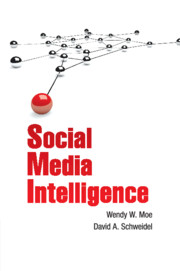Book contents
- Frontmatter
- Contents
- Preface
- Part I Foundations
- Part II Online Opinion or Online Noise
- Part III Conversational Trends
- Part IV Social Media Intelligence
- 7 Managing Social Media Communities for Better Social Media Intelligence
- 8 Cutting through the Online Chatter
- 9 Intelligence Integration
- 10 Building Social Media Intelligence into Our Strategies
- 11 Moving from Social Media Monitoring to Social Media Intelligence
- Index
- References
7 - Managing Social Media Communities for Better Social Media Intelligence
from Part IV - Social Media Intelligence
Published online by Cambridge University Press: 05 February 2014
- Frontmatter
- Contents
- Preface
- Part I Foundations
- Part II Online Opinion or Online Noise
- Part III Conversational Trends
- Part IV Social Media Intelligence
- 7 Managing Social Media Communities for Better Social Media Intelligence
- 8 Cutting through the Online Chatter
- 9 Intelligence Integration
- 10 Building Social Media Intelligence into Our Strategies
- 11 Moving from Social Media Monitoring to Social Media Intelligence
- Index
- References
Summary
It used to be that when a new movie was released, moviegoers would look to the opinions of professional movie critics before deciding whether to see it. Under this paradigm, professional critics wielded an enormous amount of power and influence to either make or break a new movie. In today’s environment, however, social media host reviews from anyone who wants to share an opinion. And now, before we head out to the theaters, we look online for not only the reviews provided by professional movie critics but also the reviews posted by friends, and sometimes even strangers, who have already seen the movie.
Arguably, social media have the potential to give a voice to everyone, making us less reliant on the opinions of a few experts. As consumers, that means that we have available to us a wider variety of opinions. Thus, we can follow the opinions of trusted sources who share our views rather than individuals whom others have deemed to be experts. This means that through social media, an organization or business has access to the wide variety of opinions held by its various customers and stakeholders. Their opinions, rather than those of a few top executives, can now drive many of the organization’s strategic decisions. Is this a good thing? Should a company trust HiPPO (the Highest Paid Person’s Opinion) or should it follow the opinions of masses on social media?
- Type
- Chapter
- Information
- Social Media Intelligence , pp. 109 - 127Publisher: Cambridge University PressPrint publication year: 2014



